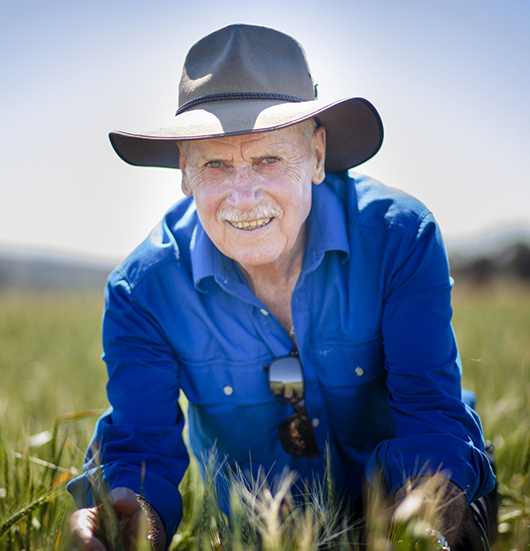The best time to manage a drought is before a drought
Farmers are being urged to prepare now for the effects of future drought.

Farmers urged to act now to get ahead of the cycle while times are good.
Yields are high and commodity prices are generally strong across the board. Rural confidence is at a 20-year high. So many are saying ‘let the good times roll’.
Well, yes and no – that’s according to Professor Tim Reeves, Co-Director of the Victoria Drought Resilience Adoption and Innovation Hub, a new collaboration between government, academia, industry and community to ensure farm and related businesses are better informed, more productive, and more profitable in the face of future droughts.
Professor Reeves urges producers to act when their farming business is in a favourable position to enhance future drought resilience, as this is when farmers can have the biggest impact in preparing for the inevitable, difficult times.
“It’s wonderful to see Victoria’s farming communities generally doing well. Part of our job now is to ensure this continues when the seasons inevitably turn,” Professor Reeves said.
“It is critical farmers take action regarding decisions or investments that can set themselves up for the long term, while cash flow is good and there’s opportunity to invest.
“It could be long-term fodder supply, building stock containment infrastructure or looking at options to diversify the farming business, through geographic location, or transitioning into different production systems. Renewable energy could also be an option, reducing energy bills while investing in environmental outcomes, while other off-farm investments can deliver a return, spreading risk.
“Planning for the future is fundamentally important.”
Professor Reeves said there are four key stages of the drought cycle, and steps must be taken at each stage of the cycle to truly build drought resilience and preparedness.
“There are the good times when there’s a dollar in the pocket, and there are the uncertain periods, where an El Niño might be forecast and the future is uncertain. It’s during these periods where the rubber hits the road, with prompt, effective decision-making essential to limit drought’s impact on a farming business.
“There is the drought itself, where risk and cost are front of mind – and mental health must be looked after – and the recovery where ‘green shoots’ are signaling things are possibly on the way back. Here, farmers can ramp up effectivity, generate cash flow and set themselves up to go again.
“The Victorian Drought Hub will give farmers and rural communities tools to address vulnerability to drought through this cycle, with five regional nodes developing new ways to collaborate and drive on the ground outcomes for farmers and communities.”
The North-East Node is being led by Riverine Plains Inc and the group’s Director of Research, Dr Sara Hely, said that farmers and agribusiness in the region are gaining confidence with managing drought years.
“Farmers learnt from the millennium drought and 2018’s big dry, and one of the key lessons was that their best tool for weathering drought is keeping cash in reserve,” said Dr Hely.
“The importance of diversifying farm incomes, through having a member of the farming family with another income stream, and/or leasing machinery to farmers in other regions with an earlier or later season, has also been raised as a key strategy for dealing with drought” she said.
Consultations with farmers in the North East Node have highlighted the role that social and business events play in supporting farmers and agribusiness during drought, when mental and financial stress is high, as well as the value of education, training and upskilling while times are relatively good.
“Right now is a terrific time to take up educational and training opportunities, and I’d encourage farmers and agribusiness to make the most of this in-between period to upskill their business and financial management or operational qualifications, and by researching and developing new ideas,” added Dr Hely.
The Victorian Drought Resilience Adoption and Innovation Hub is funded by the Commonwealth Government and will contribute $8 million over four years through the Future Drought Fund.
The program is led by the University of Melbourne’s Dookie Campus and is conducted in association with Deakin, La Trobe, and Federation University and Agriculture Victoria; and is supported by five regional nodes across Victoria. These regional nodes are all led by highly respected farming/industry groups – BCG (NW Node); Riverine Plains (NE Node); Food & Fibre Gippsland (Gippsland Node); Southern Farming Systems (SW Node), and Mallee Regional Innovation Centre (NW Irrigated Horticulture Node).
Each node is currently consulting the agricultural industry through farmers, councils, businesses, health organisations, and community groups in their region about how to meet local needs best.
Professor Reeves said the feedback was already uncovering key priorities for action and possible seed funding, from learning from the last drought, new R&D priorities, extension and capacity building, community development, and health and mental health support.
“To get involved and to share your thoughts or ideas for building more resilient farming businesses and communities, get in touch with your local node or any other Hub partner that you wish.
“Together, we will deliver the biggest impact for producers and the community. That’s what this is all about,” Professor Reeves said.
Anyone interested in getting involved in the consultation is encouraged to contact their node at:
- Gippsland, Food and Fibre Gippsland: Julian Hill, julian.hill@foodandfibregippsland.com.au
- South-West, Southern Farming Systems: Bret Ryan, office@sfs.org.au
- North-West, Birchip Cropping Group: Tom Draffen, droughtinnovationhub@bcg.org.au
- North-West Irrigated Horticulture, Mallee Regional Innovation Centre: Rebecca Wells, rebecca.wells1@unimelb.edu.au
- North-East: Riverine Plains: Dr Sara Hely, research@riverineplains.org.au
Author
NEWS
Catch up on our latest project and event news.
-
Livestock
-
People
-
Grains

